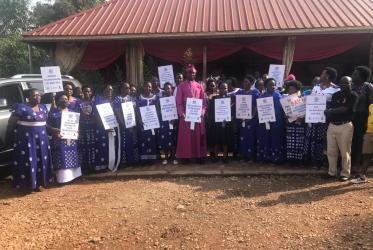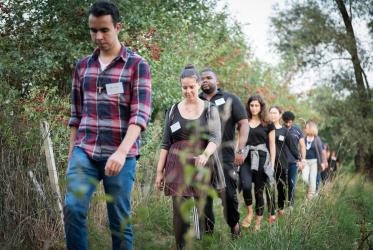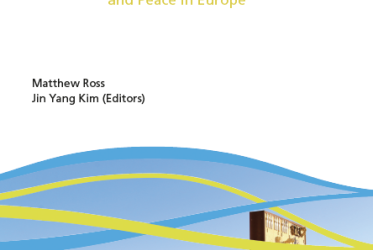I was a young American humanitarian worker on my first field assignment; Pietro had been in the region for years. On this side of the border, I was in charge, but he had more personal authority and could easily have made the call. His office depended on mine, however, to operate in the inhospitable space of South Sudan, still in the throes of seeking national independence. Clearly, Pietro wanted to know with whom he was dealing.
Americans are an altruistic people, but often that altruism comes from a place of comfort, of surplus. We click a “Go Fund Me” page, buy some cookies, volunteer some spare time. However, in pockets of this country and across the global south, altruism often comes not from a place of comfort, but from personal core reserves. Like the widow at the temple in the gospel story, across the world billions of people make daily choices to give not from their “extra” but from a sense of common humanity. It is a calculation of risk, fear, and the needs of others, and that is what Pietro wanted to see me balance. It is the same choice that COVID has posed to us en masse.
To be clear, making the choice to meet the needs of others isn’t heroism. Heroism is what the health care workers, childcare providers, grocery store employees, and other essential workers did in March and April when they went to work not even fully comprehending the risks, but knowing that without them the rest of us couldn’t continue. They charged into the breach when PPE was scarce, and information limited. That was heroism; it’s unreasonable to expect that from all of us.
Nor is the calculation I’m talking about heroism’s direct opposite, which is, rather, manifested by those who refuse to weigh the risk to others and themselves, who fail to wear masks when appropriate or quarantine when necessary. These people take on foolish risk, and, worse, push unnecessary risk on others because of their ego or sense of entitlement.
What I’m talking about is something in-between those spaces. Call it holistic humanity: a sense of humanity that refuses to put self-security on a pedestal and that accepts co-responsibility for the needs of others. It is not ruled by fear. It does not pull up its draw bridge in the face of hardship or danger nor shutter its’ windows under the pretense of “better safe than sorry.”
In much of the world, holistic humanity is a way of life that arises amid scarcity, amid the lack of resources that is the daily lot of people the world over. It is not heroism; it is much more commonplace than that. We may want to call it heroism so that we can exempt ourselves from shared responsibility from and obligation to others, but it is not. Instead, it is the simple calculus we each make when faced with risk, fear, and the needs of others.
The extreme negative manifestation of that calculus is what drives people to stockpile N-95s when there aren’t enough for health care workers, or jump the vaccine line ahead of their turn. A mundane manifestation occurred when people stockpiled toilet paper; driven by fear and panic they created scarcity where none existed. Those are cases where fear wins the calculus, driving people to abandon any sense of responsibility for each other and to simply focus on ensuring their own sense of security.
But the COVID pandemic also has brought out many incidents of people in our privileged country embracing a sense of holistic humanity. I’ve personally seen it in the teachers in my daughter’s preschool and the ushers at my church. Their choice isn’t necessarily heroic, but it is courageous and rooted in a sense of shared obligation. Their choice to favorably weigh the needs of others is based on their understanding of the risks involved and doing what they can to mitigate them. Yet no amount of mitigation can eliminate all risk and no amount of knowledge can eliminate all fear, so what tips the balance has to be courage and a shared responsibility for the good of others. Despite calculated risk and persistent fear, they serve, and their service enables my church community to worship and my daughter to gain the experience she needs to grow and develop.
Across this nation we are being called both collectively and personally, intimately, to consider holistic humanity. For many of us, as we navigate the pandemic, it may be the first time we’ve found ourselves in this position. Each person must make their own calculation of risk, fear, and responsibility to others’ needs. The way in which COVID poses this question will differ for each one of us based on our societal role, status, and circumstance. But in every case, how we weigh these factors will tell us much about ourselves and where we may need to foster personal growth.
When I think of my own choices, I cringe as I recall the many times where I allowed fear to win the calculus, where I abandoned my belief in shared responsibility and imposed costs on others because I failed to act as a holistic human. However, when I remember that moment in northern Uganda, when Pietro and I loaded the injured man and one of his companions into our vehicle, I have no regrets. We confirmed they weren’t armed and believed that transporting one companion provided a good balance between our risk and the injured man’s need.
Unlike many other crises in our history, the COVID pandemic calls us to look at each choice we make and balance our risk, the risk to those around us, our fears (rational or not), and our obligation to the needs of others. When these come into tension, we must make a calculation and decide how we will act. COVID, like Pietro, is offering us an opportunity to see what we’re truly made of.





